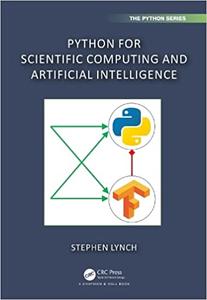
Free Download Python for Scientific Computing and Artificial Intelligence
by Stephen Lynch;
English | 2023 | ISBN: 1032258713 | 233 pages | True EPUB | 23.87 MB
Python for Scientific Computing and Artificial Intelligence is split into 3 parts: in Section 1, the reader is introduced to the Python programming language and shown how Python can aid in the understanding of advanced High School Mathematics. In Section 2, the reader is shown how Python can be used to solve real-world problems from a broad range of scientific disciplines. Finally, in Section 3, the reader is introduced to neural networks and shown how TensorFlow (written in Python) can be used to solve a large array of problems in Artificial Intelligence (AI). This book was developed from a series of national and international workshops that the author has been delivering for over twenty years. The book is beginner friendly and has a strong practical emphasis on programming and computational modeling. Features: No prior experience of programming is required. Online GitHub repository available with codes for readers to practice. Covers applications and examples from biology, chemistry, computer science, data science, electrical and mechanical engineering, economics, mathematics, physics, statistics and binary oscillator computing. Full solutions to exercises are available as Jupyter notebooks on the Web. In 2022, Stephen Lynch was named a National Teaching Fellow, which celebrates and recognises individuals who have made an outstanding impact on student outcomes and teaching in higher education. He won the award for his work in programming in the STEM subjects, research feeding into teaching, and widening participation (using experiential and object-based learning). Although educated as a pure mathematician, Stephen's many interests now include applied mathematics, cell biology, electrical engineering, computing, neural networks, nonlinear optics and binary oscillator computing, which he co-invented with a colleague. He has authored 2 international patents for inventions, 8 books, 4 book chapters, over 40 journal articles, and a few conference proceedings. Stephen is a Fellow of the Institute of Mathematics and Its Applications (FIMA) and a Senior Fellow of the Higher Education Academy (SFHEA). He is currently a Reader with MMU and was an Associate Lecturer with the Open University from 2008-2012. In 2010, Stephen volunteered as a STEM Ambassador, in 2012, he was awarded MMU Public Engagement Champion status, and in 2014 he became a Speaker for Schools. He runs national workshops on "Python for A-Level Mathematics and Beyond," and international workshops on "Python for Scientific Computing and TensorFlow for Artificial Intelligence." He has run workshops in China, Malaysia, Singapore, and the USA.
